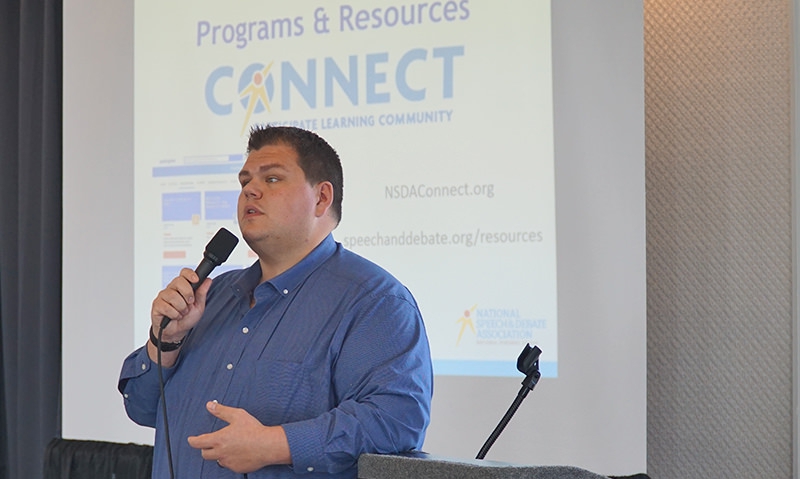
Oratorical chairmen gain insight into growing program
A goal for American Legion department Oratorical chairmen is to grow the Constitutional speech contest at the post level for greater success at the district and national level. During the Legion’s 19th annual National Americanism Conference last weekend, Oratorical chairmen gained a few tips on how to accomplish this.
For the past 20 years, the National Christian Forensics and Communications Association (NCFCA) has been providing homeschool students with opportunities to address life issues from a biblical world view through speech and debate competition, short film contests and writing contests.
“Just like The American Legion, we are equipping students to become contributing members of society; we are committed to the next generation,” said Bridget Rogers, development director for NCFCA. “Our goal is to help students learn to research thoroughly, to think critically, and to speak persuasively. Really, when it comes right down to it, we want to help these kids find their voice. And to be contributing, thoughtful members of our communities.”
NCFCA offers 65 tournaments yearly from January to June that involve 4,000 homeschool students ages 12 to 19 from 45 states. Rogers said The American Legion has a “special place in our heart” because two of their former homeschool competitors are American Legion National Oratorical Contest champions – 2016 winner Ben Crosby of Burlington, Wash., and 2012 winner Rebecca Frazer of Morgantown, Ind.
“We want our kids to be in your contest, and we want your kids to be in our contest,” Rogers said. “It’s not all about homeschool kids but homeschool kids are being equipped in a beautiful way. And so we think they would make wonderful students for your contest. If we can work together, both of our organizations could win.”
A few ideas for collaboration efforts that Rogers shared were to have Legionnaires volunteer as judges for NCFCA tournaments, promote each other’s competitions at the local and regional level, and to contact one of NCFCA’s 10 regional directors to begin a working relationship. Find a list of regional directors here.
“We want to work with people who volunteer, who are investing in the kids just like you are,” Rogers said.
The idea of connecting and communicating with speech and debate leaders in the community to build a relationship was the advice National Speech and Debate Association’s (NSDA) Director of Community Engagement Steve Schappaugh also referenced to conference attendees. Schappaugh delivered a contact list of NSDA’s volunteer leaders in its 111 districts nationwide to initiate communication.
“Reach out to them and start talking with them about how you can fold them into your (Oratorical) program and get more students involved,” he said. “Make that connection and talk to them about the ease of participation in your Oratorical Contest.”
The ability for Schappaugh to provide the contact list was thanks in part to the relationship formed in 2010 between The American Legion and NSDA.
“The mission of NSDA is to connect, support and inspire a diverse community committed to empowering students through competitive speech and debate,” he said. “The American Legion Oratorical Contest is an opportunity for us to connect students to competitive speech and debate. The scholarships you provide are an opportunity for us to support and inspire students through competitive speech and debate. You can see with the mission of the organization why it is so critical for us to work with The American Legion to help provide opportunities to our students.”
NSDA has 150,000 students as members and 5,500 educators who are NSDA coaches. “It would be amazing if every coach we had would bring one student to The American Legion Oratorical Contest,” Schappaugh said. “I attended the national contest last year and I was blown away by what I saw with how the tournament was ran, the volunteers and the students who participated.”
Through the relationship, the top three finishers in the Legion’s National Oratorical Contest qualify to enter into the NSDA’s original oratory or United States extemporaneous speaking category at its national competition.
“That’s how special our relationship is with The American legion. We would not let students come to our national tournament if we did not think they were worthy of that distinction of honor,” Schappaugh said. “And we think the process that you have put in place merits that type of consideration for the students who make it to the top three at your contest.
“Overall, our values are inclusion, integrity, leadership and service. All things that The American Legion can stand behind.”
